
 |
|
|
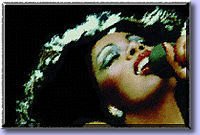 Donna Summer: Artcraft made with Computergraphic by Giorgio Moroder. More about Giorgio Moroder Computergraphic can be found on my Giorgio Moroder Artshow page. |

|
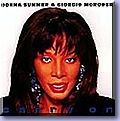
|
|
The Grammy award was
won by Donna Summer and Giorgio Moroder 28 february 1998 for
|
|
Review
- All Music Guide |
| Miscellaneous |
|
Born as Donna Adrian Gaines, grew up in Dorchester ( Massachusetts) a city nearly Boston. Her father was a butcher, her mother a school teacher. As a child she sang in Boston-area church choirs. She piled up hundreds of truancy slips, skipping school in order to sing with a local rock band. Two months before high school graduation, she dropped out. In 1967, at age 18, she debuted at Boston's Psychedelic Supermarket. |
|
In 1971, when she was in Austria, she married local actor Helmut Sommer ( was also in the cast of Hair ). Although their marriage would dissolve in 1976 under the pressure of Donna Summer's disco success, she continued to use the anglicized version of his last name |
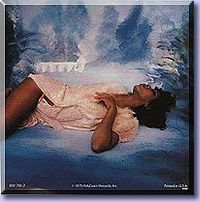
|
1973 in Germany, performing in a production of Godspell and working as a session singer in Munich's Musicland studios, Summer met producer Giorgio Moroder. Moroder was to be called Summer's "Svengali" due to his influence on her career. On the Oasis label, owned by Moroder and partner Pete Bellotte, Summer made a couple of European hits that were never released in the United States. Non official voices claim Donna met Giorgio at first in Giorgio`s Birthplace "Ortisei" ( Italy ) during a short holyday of Donna on the Dolomite Mountains. |
|
1975
saw the end of Summer's relative obscurity, and "Love to Love You Baby"
was the reason why: 17 minutes of romantic lyrics, disco beat, and feigned
orgasm delivered while lying down on the studio floor with the lights
dimmed. Spin magazine said of this song that it "launched the extended
dance mix as we know it and invented the 12-inch. Casablanca records received
the U.S. license and became Summer's record company upon her return to
the United States. The song was an immediate disco hit and within months
found its way up both the pop and rhythm and blues charts, hitting Numbers
Two and Three, respectively. |
|
Summer released an album named for the hit single in 1976. Love to Love You Baby nearly made the U.S. Top Ten and reached Number 16 in the United Kingdom. She and her producers were determined not to be merely a flash in the pan. In June of that year, the Summer- Moroder-Bellotte team released "A Love Trilogy" and also managed to squeeze in "The Four Seasons of Love" by December. |
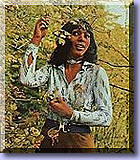
|
|
The first of her albums with a title that did not contain the word "love," the 1977 release "I Remember Yesterday" generated the singer's second gold single "I Feel Love." The song, a synthesizer pop hit, extended Summer's stylistic range, according to The Rolling Stone Encyclopedia of Rock and Roll. In 1978, Summer contributed most of the lyrics to the disco/fairy tale concept album Once Upon a Time, which she claimed was mostly autobiographical. The Cinderella-toned lyrics talked of girls who "live in a land of dreams unreal / Hiding from reality ... trapped within their world." Later in 1978, on Live and More, Donna covered Jimmy Webb's "MacArthur Park" for an unpredictable massive hit, her first appearance in slot Number One on the pop charts. |
|
As the 1970s ended, it seemed Summer could do no wrong. Between 1978 and 1980 she earned eight Top Ten hits. She even became a film star, portraying an aspiring singer in 1979's Thank God It's Friday. While one critic suggested audiences would thank god when this movie was over, the film's Number Three hit song "Last Dance" won an Oscar and two Grammys: one for Summer and one for writer Paul Jabara |
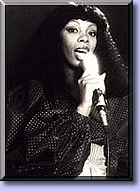
|
Bad Girls, a 1979 number one double album, was Donna's last recording for Casablanca. Four songs from this album reached the Top Ten, many sitting there for weeks, variously occupying the Number One and Two positions. But according to The Encyclopedia of Pop Rock & Soul Summer was depressed by her struggle with Casablanca to go beyond disco. She claimed that she'd been "stuck doing something that had been choking me to death for three years." She began including religious songs in her performances, a return to her church roots and a reflection of a desire for inner peace. |
|
This soul weariness took formal expression in a lawsuit against manager Joyce Bogart and husband Neil Bogart's Casablanca Records to the tune of $10 million. When the legal dust settled, Summer was released from her contract and signed with Warner Brothers' newly formed Geffen label. |
|
In 1980, David Geffen signed Summer as the first act for his new label, rescuing her from a bad financial arrangement with her management and Casablanca. The redemption echoed her spiritual epiphany: Summer became born-again. A rumor, which she denies, claimed she said that AIDS was God's revenge on gays. Summer apologized for any misunderstanding, but the gay audience that had been at the core of her success remained wary. Except for a few sporadic hits, the latest in 1989, the dancing queen never again strode the charts the way she did in the synthetic '70s, and the anthology's ecstatic blast fades to less thrilling fare by the last track. |
|
The religious thread in her music continued for the next few years but did not cost her much popular appeal, perhaps because the disco fever had already lifted. "He's a Rebel," from her 1983 Mercury release, She Works Hard for the Money, won a Grammy for best inspirational performance--a trick Summer would repeat the following year with the cut "Forgive Me" off Cats Without Claws. |
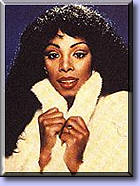
|
|
Donna continued to work steadily throughout the eighties, although six years were to pass after "She Works Hard for Her Money" before she penetrated the Top Ten again. "This Time I Know It's for Real," off 1989's Another Place Another Time, reached Number Seven. By this time Summer had moved into other areas of self-expression. Her neo-Primitive paintings and lithographs proved popular; in June 1990, a Beverly Hills gallery sold 75 such works for up to $38,000 apiece. |
|
Summer
has never stopped producing or changing. In a Billboard interview, she
discussed her latest transformation--into a country music singer. Together
with musician/husband Sudano, she has penned several country songs, including
the hit "Starting Over" with Dolly Parton. Questioned by the interviewer
regarding these many transformations, as well as the personal and professional
ups and downs of her life, Summer responded with a painting metaphor.
Think of a painting, she said, which is left in the sun. The painting
fades but "also takes on new colors. And instead of the colors being as
vivid as they once were, they change into different and perhaps richer
colors." One cannot help but sense that Summer's rainbow of colors will
continue to grow richer for many years.
|
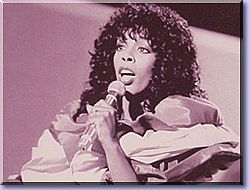
|
|
|